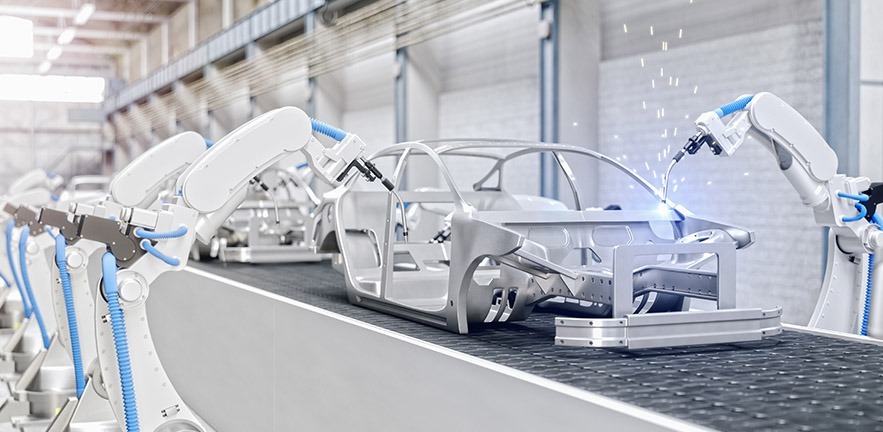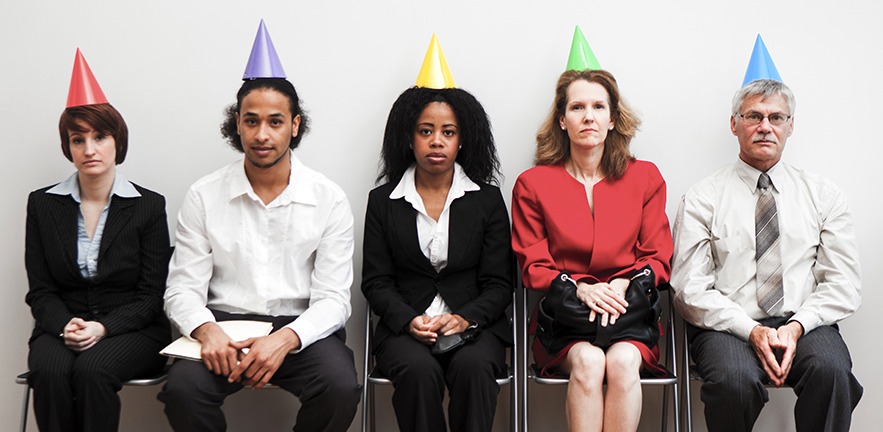
The Cambridge Judge Business Debate podcast series, featuring faculty and others associated with Cambridge Judge Business School and the broader Cambridge community, is designed to shed light on important topics within the broad research and teaching remit of Cambridge Judge Business School – including issues relating to management, trade, technology and the global economy.
The podcasts are hosted by Michael Kitson, University Senior Lecturer in International Macroeconomics at Cambridge Judge.
Topics covered so far in the podcasts include globalisation, which as described by Michael Kitson “goes back to before the Industrial Revolution, and there are periods where it has stalled and gone into reverse”, and inequality in all its forms, which explored rising wage gaps and was recorded just days before International Women’s Day 2018.
The podcasts
How do AI, video conferencing and other technologies affect the workplace?
In this episode, joining podcast host Michael Kitson, University Senior Lecturer in International Macroeconomics at Cambridge Judge Business School, are are John Gourd, CEO of the Cambridge Network; Dr Mia Gray, University Senior Lecturer at the Department of Geography and Fellow of Girton College, University of Cambridge; and Jaideep Prabhu, Professor of Marketing at Cambridge Judge Business School.
From Uber to Deliveroo, the 'gig economy' is increasingly visible. But with flexibility for workers comes uncertainty, so what is the future of the gig economy including the role of government?
Though seemingly trivial, office politics can affect the performance of employees and organisations. The latest podcast in the Cambridge Judge Business Debate series asks how can we improve them?
In this episode, joining podcast host Michael Kitson, University Senior Lecturer in International Macroeconomics at Cambridge Judge Business School, are Cambridge Judge colleagues Jaideep Prabhu, Professor of Marketing; Bruno Cotta, Executive Director of the Entrepreneurship Centre; and Mark Andrews, Digital Learning Programme Manager.
In this episode, joining podcast host Michael Kitson, University Senior Lecturer in International Macroeconomics at Cambridge Judge Business School, are Cambridge Judge faculty Dr Simon Learmount, Lecturer in Corporate Governance at Cambridge Judge, and Dr Thomas Roulet, University Senior Lecturer in Organisation Theory & Information Systems.
Innovation ecosystems – networks and places to exchange ideas – are helping to unlock value through collaboration across industries.
Insight
Business opportunities and challenges in Brazil (The Cambridge Judge Business Debate podcast series)
This month's Cambridge Judge Business Debate podcast was recorded in Brazil, as part of the international business trip of the Executive MBA (EMBA) class of 2018 of Cambridge Judge Business School.
How ageing societies can afford healthcare for all and reform an organisational system that has not kept pace with technology.
A 'tough sell': why it is so difficult to address climate change on a global scale.
How have the concepts of corporate governance evolved, and are they fit for purpose in this disruptive era? In this episode, joining podcast host Michael Kitson, University Senior Lecturer in International Macroeconomics at Cambridge Judge Business School, are Cambridge Judge faculty Simon Learmount, Lecturer in Corporate Governance; Jennifer Howard-Grenville, Diageo Professor of Organisation Studies; and Shahzad (Shaz) Ansari, Professor of Strategy & Innovation. This is the ninth in a series of "Cambridge Judge Business Debate" podcasts featuring faculty and others associated with Cambridge Judge Business School and the broader Cambridge community. This latest podcast focuses on corporate governance – including the definition of corporate governance, geographical differences and the role of social media. Here is an edited transcript of some of the podcast discussion: How should corporations and other organisations be governed? Michael Kitson: "We want our companies to be run well, but systems of corporate governance vary around the world, so what are the characteristics of an effective system of corporate governance? Simon Learmount: "There are two different views of corporate governance. One is a very narrow view that corporate governance is about insuring that company managers and directors act in the best interest of the company's owners, who are shareholders…
Just what is "innovation" – and is there a dark side to this wave of change that has transformed our lives through technology and other breakthroughs? In this episode, joining podcast host Michael Kitson, University Senior Lecturer in International Macroeconomics at Cambridge Judge Business School, are Cambridge Judge faculty Sucheta Nadkarni, Sinyi Professor of Chinese Management; Simon Stockley, Senior Faculty in Management Practice; and Jeremy Hutchison-Krupat, University Senior Lecturer in Operations and Technology Management. This is the eighth in a series of "Cambridge Judge Business Debate" podcasts featuring faculty and others associated with Cambridge Judge Business School and the broader Cambridge community. This latest podcast focuses on innovation – including the definition of the term, the role of platforms and connectivity, and the role of government in providing the right practical and legal framework. Here is an edited transcript of some of the podcast discussion: Innovation is one of those buzzwords that dominates corporate and economic discussion. So what is it? Michael Kitson: "We're continually hearing the mantra that firms have to be more innovative to thrive and prosper. But what is innovation: is it all about technological change or something broader?" Jeremy Hutchison-Krupat: "Innovation is something, first, that is…
We've heard all the buzz phrases, ranging from 'peer-to-peer lending' to 'cryptocurrencies'. But behind the hype, what exactly is alternative finance, and what are the benefits and risk? In this episode, joining podcast series host Michael Kitson, University Senior Lecturer in International Macroeconomics at Cambridge Judge Business School, are Robert Wardrop, co-founder of the Cambridge Centre for Alternative Finance; Stelios Kavadias, Margaret Thatcher Professor of Enterprise Studies in Innovation and Growth at Cambridge Judge, and Bart Lambrecht, Professor of Finance at Cambridge Judge. This is the seventh in a series of “Cambridge Judge Business Debate” podcasts featuring faculty and others associated with Cambridge Judge Business School and the broader Cambridge community. This latest podcast focuses on the topic of alternative finance, which includes cryptocurrencies such as bitcoin and also new routes for lending and borrowing that originate outside the traditional banking system. What is alternative finance? Michael Kitson: “Finance is the main lubricator of modern finance, but the financial sector itself is going through a period of rapid change – awash with a confusing range of new products and technologies such as cryptocurrencies, crowdfunding and peer-to-peer lending. So just what is ‘alternative finance'”? Robert Wardrop: “What it isn’t is private…
The financial crisis has revived the notion of industrial policy in the UK. But how is it different today from the 'discredited' policies of the 1970s, and do we risk betting on winners once again? In this episode, joining podcast series host Michael Kitson, University Senior Lecturer in International Macroeconomics at Cambridge Judge Business School, are Alan Hughes, Professor of Innovation at Imperial College Business School and former Director of the Centre for Business Research at Cambridge Judge Business School, and Michael Pollitt, Professor of Business Economics at Cambridge Judge. This is the sixth in a series of “Cambridge Judge Business Debate” podcasts featuring faculty and others associated with Cambridge Judge Business School and the broader Cambridge community. This sixth podcast focuses on the topic of Industrial Policy, which has been in the news since the November 2017 publication of the UK government’s White Paper entitled “Industrial Strategy: Building a Britain Fit for the Future”. Here are some of the issues raised in the podcast, along with edited excerpts of remarks made by the panellists: The financial crisis has revived the idea of “industrial policy” Michael Kitson: “Since the financial crisis and the great recession, there’s been a re-evaluation of…
Companies and countries have always dealt with risks, but new threats such as cyber security are now changing the equation. How do you measure risk, what is the impact of recent events such as the Brexit vote, and what is the difference between risk and uncertainty? In this episode, joining podcast series host Michael Kitson, University Senior Lecturer in International Macroeconomics at Cambridge Judge Business School, are Dr Jennifer Daffron, Research Associate specialising on cyber risk at the Cambridge Centre for Risk Studies; Daniel Ralph, Academic Director of the Cambridge Centre for Risk Studies and Professor of Operations Research at Cambridge Judge; and Jochen Runde, Professor of Economics & Organisation at Cambridge Judge. This is the fifth in a series of "Cambridge Judge Business Debate" podcasts featuring faculty and others associated with Cambridge Judge Business School and the broader Cambridge community. This fifth podcast focuses on the topic of risk, to coincide with the 9th Risk Summit of the Cambridge Centre for Risk Studies, held on 20 June in London with the theme "Risks Beyond Boundaries". Here are some of the key issues raised in the podcast, along with edited excerpts of remarks made by the panellists: It's risky out…
Statistics show that gender inequality at the workplace is pervasive, with lower pay and under-representation at top levels for women. How does this harm business, and should governments intervene? In this episode, joining podcast series host Michael Kitson, University Senior Lecturer in International Macroeconomics at Cambridge Judge Business School, are Sucheta Nadkarni, Sinyi Professor and Director of the Wo+Men's Leadership Centre at Cambridge Judge; Belinda Bell, Director of the Cambridge Social Ventures programme at CJBS's Cambridge Centre for Social Innovation; and Dr Mia Gray, University Senior Lecturer at the Department of Geography and Fellow of Girton College, University of Cambridge, whose research focuses on the political economy and labour market geographies. This is the fourth in a series of "Cambridge Judge Business Debate" podcasts featuring faculty and others associated with Cambridge Judge Business School and the broader Cambridge community. This podcast focuses on the topic of gender inequality in the workplace, in advance of the annual conference of the CJBS Wo+Men's Leadership Centre on Saturday 9 June, which focuses on the topic of "Growing Talent: Fostering Collective Success". The conference at Cambridge Judge Business School will address the tools, relationships and mindset behind building a successful career, looking at how…
Silicon Valley is a big success story, spawning the likes of Google and Apple. But what are the secrets of this success, and what challenges does Silicon Valley face to retain its leadership role? This episode of the Cambridge Judge Business Debate series was recorded in San Francisco, during the international business trip of the Executive MBA (EMBA) class of 2017 of Cambridge Judge Business School. The session was part of an alumni reception, with the audience including EMBA students, Cambridge Judge alumni, and alumni of other programmes of the University of Cambridge. Faculty members Michael Kitson, University Senior Lecturer in International Macroeconomics, and Jochem Kroezen, University Lecturer in International Business, led the discussion featuring two special guests: Lisa Van Dusen, Chief Relationship Officer of SV2, an early stage venture capital firm for the social venture sector, and Naeem Zafar, CEO of Internet of Things startup TeleSense and Dean’s Teaching Fellow & Lecturer at the University of California Berkeley. This is the third in a series of “Cambridge Judge Business Debate” podcasts featuring faculty and others associated with Cambridge Judge Business School and the broader Cambridge community. This third podcast focuses on the success and challenges of Silicon Valley –…
Since the early 1980s there has been widening income and wealth inequality in many industrialised countries. Why has this happened? Is it a problem? And if it is, what should we do about it? In this episode, joining podcast series host Michael Kitson, University Senior Lecturer in International Macroeconomics, are Cambridge Judge Business School's Jennifer Howard-Grenville, Diageo Professor in Organisation Studies, Dr Kamal Munir, Reader in Strategy & Policy, as well as the Race & Inclusion Champion at the University of Cambridge, and Belinda Bell, Director of the Cambridge Social Ventures programme at CJBS's Cambridge Centre for Social Innovation. This is the second in a series of "Cambridge Judge Business Debate" podcasts featuring faculty and others associated with Cambridge Judge Business School and the broader Cambridge community.This second podcast focuses on the topic of inequality. Here are some of the key issues raised in the podcast, and edited excerpts of the remarks made by the panellists: Growth in inequality: how bad is it? Michael Kitson: "For some the growth of inequality in the industrialised world is a natural outcome of the operation of market forces and economic growth. I have to say that is not an argument that I find…
Is the globalisation which has shaped our world over recent decades slowing or even moving backwards in the wake of the Brexit vote in Britain and the election of Donald Trump as US president, asks the first podcast in the Cambridge Judge Business Debate series. “Globalisation isn’t a new phenomenon. It didn’t start in the 1980s in business schools – it goes back to before the Industrial Revolution, and there are periods where it has stalled and gone into reverse,” says podcast series host Michael Kitson, University Senior Lecturer in International Macroeconomics at Cambridge Judge. Other participants in this first episode are Jennifer Howard-Grenville, Diageo Professor in Organisational Studies and Director of the Doctoral Programme at the Business School; Stelios Kavadias, Margaret Thatcher Professor of Enterprise Studies in Innovation & Growth and Director of the Entrepreneurship Centre; and Neil Stott, Director of the Master of Studies in Social Innovation programme and the Cambridge Centre for Social Innovation. This is the first in a series of “Cambridge Judge Business Debate” podcasts featuring faculty and others associated with Cambridge Judge Business School and the broader Cambridge community. The podcasts are designed to shed light on important topics within the broad research and…



















